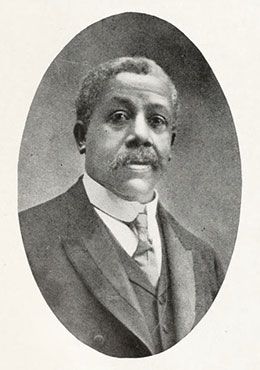Biography of Edward A. Bouchet
 The society was established with the commitment by Yale University and Howard University to recognize the life and academic contributions of Edward Alexander Bouchet. Bouchet was the first African American to earn a doctoraal degree from an American university; he earned his doctorate in Physics from Yale University in 1876.
The society was established with the commitment by Yale University and Howard University to recognize the life and academic contributions of Edward Alexander Bouchet. Bouchet was the first African American to earn a doctoraal degree from an American university; he earned his doctorate in Physics from Yale University in 1876.
Edward Bouchet was born in New Haven, Connecticut on September 15, 1852. He was the son of William Frances and Susan (Cooley) Bouchet. William Bouchet migrated to New Haven from South Charleston, South Carolina in 1824 as the valet of the father of Judge A. Heaton Robinson of New Haven. The senior Bouchet was said to have been prominent in New Haven’s black community, serving as deacon of the Temple Street Church, the oldest black church in the city. Edward Bouchet attended the New Haven High School (1866 to 1868) and graduated from Hopkins Grammar School (1870) as valedictorian of his class.
Bouchet entered Yale College in 1870 and was the first African American to graduate Yale College in 1874. On the basis of his academic record he was elected to the Phi Beta Kappa Society.
Although Bouchet was elected to Phi Beta Kappa along with other members of the Yale class of 1874, the election did not take place until 1884, when the Yale chapter was reorganized after thirteen years of inactivity. Because of the circumstances, Bouchet was not the first African American elected to Phi Beta Kappa as many historical accounts state, that honor belongs to George Washington Henderson (University of Vermont) who was elected in 1877.
Bouchet continued the study of physics as a graduate student at Yale, where he was awarded a Ph.D. in Physics in 1876. Bouchet was the first African American to earn a doctoral degree from an American university.
Upon graduation from Yale, Dr. Bouchet taught chemistry and physics for twenty-six years at the Institute for Colored Youth in Philadelphia, PA. The Institute was a Quaker institution that had earned a reputation for high academic standards since its founding in 1837. Dr. Bouchet resigned in 1902 when the Institute’s college preparatory program was discontinued “at the height of the DuBois-Washington controversy over industrial vs. collegiate education.” The school moved to Cheney, PA as a vocational and teacher-training school; the name was changed in later years to Cheney State College. From 1902 to 1903, Bouchet served as a science teacher at Sumner High School in St. Louis, Missouri in their college preparatory program. From 1903 to 1904 he served as business manager of the Provident Hospital, St. Louis and U.S. Inspector of Customs at the Louisiana Purchase Expedition (1904 to 1905).
Between 1905 and 1908, Bouchet was director of academics at St. Paul’s Normal and Industrial School in Lawrenceville, Virginia (later renamed, St. Paul’s College). In 1908 he was appointed principal of the Lincoln High School, Galipolis, Ohio, until 1913, when he joined the faculty of Bishop College in Marshall, Texas. Dr. Bouchet retired from college teaching in 1916 due to illness, when he returned to New Haven.